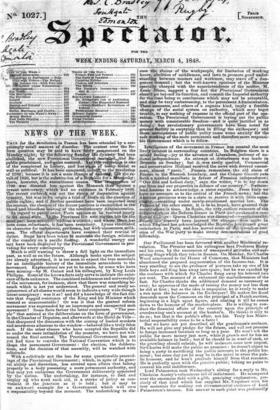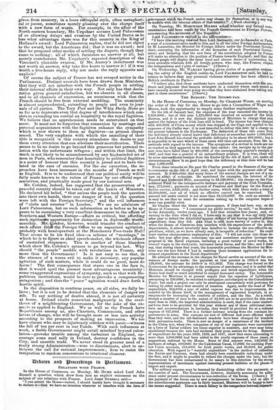Our Parliament has been favoured with another Ministerial re- velation.
The Ptemier and his colleagues beat Professor Risley and his sons, by the succession of unexpected attitudes and sur- prising flings whiCh they take in finance. On Monday, Sir Charles Wood announcedto the House ofCommons that Ministers had abandoned the proposed augmentation of the Income-tax. It is very startling to see the professor of postures take up one of his little boys and fling him away into space; but he was excelled by the coolness with which Sir Charles flung away his beloved two per cent. The manner of it enhanced the marvellousness of the fact. Sir Charles thinks the additional demand as necessary as ever; he approves of the mode of raising the money not less than he did at first ; but as the idea is unpopular, he is ready to make a run upon the balances in the Exchequer! He makes his-fiscal demands upon the Commons on the principal of a Dutch auction, beginning at a high upset figure, and abating it till he comes down to the humour of the market-piece. He is willing to con- duct the financial affairs of the country upon the principle of overdrawing one's account at the banker's. He thinks it silly to do so ; but that is the public's affair, not hip. Truly has Minis- terial responsibility come to be a farce But we have not yet described all the gentlemei0s.eoolness. He will not give any pledge for the future, and will not promise to forego increased taxation so long as a year. He won't ask the public for more money just now, while it growls and he has an available balance in bank ; but if be should be in want of cash, or the growling should subside, he will insinuate some new impost. Sir Charles will make the public no promises : he doesn't object to being a party in sacrificing the public interests to the public hu- mour; but some day yet he may be in the mood to cross the pub- lic humour, and he won't preclude himself from that resource. He is perfectly open with the pensive public; taking no pains to conceal his cool indifference.
Lord Palmerston took Wednesday's sitting for a reply to Mr. Chisholm Anstey's voluminous bill of indictment. He scampered over the enormous field with a glib, gossiping explanation, pre- cisely of that kind which has supplied Mr. Urquhart with his best materials for making out circumstantial evidence of Lord Palmerston's treason. His answer to each point was professedly given from memory, in a loose colloquial style, often metaphori- cal or jocose, sometimes merely glossing over the charge itself with a new form of words. For example, in the affair of the North-eastern boundary, Mr. Urquhart accuses Lord Palmerston of so allowing delays and evasions by the United States as to lose what advanta2e there was for this country in the- King of Holland's awardt:Tord Palmerston replies, that he did not object to the award, but the Americans did ; that it was no award ; and that be proposed other modes of settling the dispute, though they came to nothing : all of which furnishes no answer at all, but merely corroborates Mr. Urquhart's repeated description of the Viscount's plausible evasion. If Mr. Anstey's indictment was not worth an answer, why take five hours to answer it ? if it was worth a five-hours reply, why not make the reply apposite and explicit? Of course the subject of France has not escaped notice in the Parliament. Distinct avowals have been drawn from Ministers, that they will not interfere with the French people in settling their internal affairs in their own way. Not only has that decla- ration given general satisfaction, but we observe in all classes, and in all channels of expression, an unanimous wish that the French should be free from external meddling. The unanimity is almost unprecedented, extending to people and even to jour- nals of all parties. The Tory Post and the Whig Daily News go so far as to deprecate even that degree of interference which con- sists in extending too cordial an hospitality to the royal fugitives. We believe that no apprehension needs be entertained on that score. It must not be forgotten that connexion by marriage and personal acquaintance with the fugitives enhance the sympathy which is now shown to them as fugitives—as princes dispos- sessed. The very emphasis with which the annulling of their title is recognized in this country stimulates the desire to pay them every attention that-can alleviate their mortification. There seems to be no desire to go beyond this generous but personal re- lation with the unfortunate refugees ; and within that limit, the truth is not likely to be misunderstood by any highminded set of men in Paris, who remember that hospitality to political fugitives is a point of honour that this country is proud not to have vio- lated in the case of enemies. For the one exception, the re- proaches have been incessant in the mouths of French as well as English. It is to be understood that our political amity will be fully made known to the rulers of France by our official repre- sentatives, and practically made good by our national acts. Mr. Cobden, indeed, has suggested that the preservation of a peaceful country should be taken out of the hands of Ministers. He declared his belief, " that unless the people took the question into their own hands, there was danger of war, if the question were left with the Foreign Secretary," and the evil influences of " clubs and coteries" in London. We are no adulators of Lord Palmerston, but on such information as is before us he ap- pears to be sustaining a very excellent demeanour in the affairs of Southern. and Western Europe—affairs so critical, but affording such legitimate opportunity for distinction in diplomatic iitatga- manship. Mr. (louden, however, would transfer the conduct of such affairs froelt. the Foreign Office to an organized agitation ; probably with head-quarters at the Manchester Free-trade Hall? That seems to be his fixed idea—a scheme of "meetings," in which he is to figure as chief speech-maker; the wholesale effuser of unstudied eloquence. This is another of those blunders which show Mr.Cobden's aptness to go beyond his last. Why should " the people" meddle with revolutions in France, any more than the Government ? Is it not easy to see that, in the absence of a worse evil to make it necessary, any popular agitation of such matters, while it could do no good, must do harm ? The first consequence that stares one in the face is, that it would spoil the present most advantageous unanimity : some exaggerated expressions of sympathy, such as that with Re- publican institutions, would be sure to provoke a compensating antagonism ; and thus the " peace " agitation would draw forth a hostile spirit.
In the disposition to continue peace, on all sides, we fully be- lieve; but it is not to be denied that the elements of danger are rife. To say nothing of doubts abroad, it is not all certainty at home. Ireland exults somewhat malignantly in the over- throw of a neighbouring Government, for the sake of the ex- ample as applied to England. We as well as the French have Republicans among us, also Chartists, Communists, and other lovers of change, who will be brought more or less into activity according to the prospects of making an impression. We too have classes who may be injuriously stricken with panic—witness the fall of ten per cent in our Funds. With such influences at work, a feeble Government might entail mischief beyond calcu- lation—provoke trouble among the turbulent in England, en- courage some mad sally in Ireland, destroy confidence in the City, and unsettle trade. We never stood in greater need of a really strong Administration—wise to discriminate, alert to an- ticipate the call for rational improvements ; firm to resist the temptation to random concessions to irrational clamour.



























 Previous page
Previous page